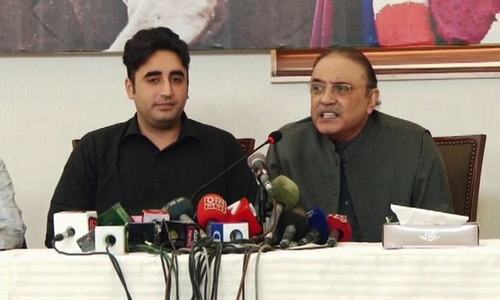KARACHI: The National Accountability Bureau (NAB) on Tuesday contended before the Sindh High Court that applications of former president Asif Ali Zardari and others against the order of a banking court regarding the transfer of the fake bank accounts and money laundering case against them to Islamabad were not maintainable since the trial court order was in accordance with the directives of the Supreme Court.
The former president and co-chairman of the Pakistan Peoples Party, his sister Faryal Talpur, detained chairman of the Omni Group Anwar Majeed, his sons and others had challenged the March 15 trial court order in the SHC.
When a set of applications came up for hearing before a two-judge SHC bench headed by Chief Justice Ahmed Ali M. Shaikh on Tuesday, NAB through its prosecutor submitted para-wise comments.
The anti-graft watchdog in its reply maintained that criminal revision applications against the banking court order were not maintainable as the order of the trial court was based on the guidelines and directives in the apex court’s Jan 7 verdict.
Says trial court order in case against Zardari and others is in accordance with SC directives
Referring to one of the contentions of the applicants’ counsel, it argued that there was no misreading and non-reading of the Jan 7 judgement since the apex court had specifically issued directives in respect of transfer of all the material and evidence collected by the Joint Investigation Team to NAB immediately.
NAB further submitted that the Supreme Court had directed the JIT to associate with it for the purpose of assistance in any further probe, inquiry or investigation that the anti-graft watchdog might consider necessary in order to satisfy itself about fulfilment of legal and procedural requirements and complete the investigation.
“NAB was directed that if it considers expedient and appropriate to conduct any further or additional probe, inquiry or investigation involving the matter which are the subject matter of the JIT, from a point of view of determining the true facts, it shall be free to do so in Islamabad,” it added.
The anti-graft watchdog maintained in its reply that the apex court further directed it that in view of the fact, the entire record of the JIT was to be submitted to NAB in Islamabad and further inquiry, if any, was also to be conducted there and a reference to be prepared and filed before the accountability courts in Islamabad/Rawalpindi.
It further argued that the investigation conducted by the JIT on the directive of the apex court inter alia other documents/material and evidence were the offshoot of FIR 4/18, the case transferred from banking court Karachi to Islamabad.
NAB maintained that the final synthesis report of the JIT had been discussed by the apex court in its Jan 7 judgement, thus the order had to be followed in its letter and spirit rather final synthesis of the JIT.
Separate provisions
It further submitted that the banking court judge rightly concluded that Sections 16-A(a) and 16-A(b) of the National Accountability Ordinance, 1999, were separate provisions, distinguish from each other, and requested the SHC to dismiss the applications for not being maintainable.
When the bench asked the NAB prosecutor for arguments, he said he was ready to advance his arguments, but the former president’s lawyer sought time to go through NAB’s reply. Therefore, the bench adjourned the hearing till April 2.
On March 15, the banking court had transferred the money laundering case involving Rs4.14 billion against Mr Zardari, his sister and 17 other suspects to an accountability court in Rawalpindi for trial after allowing an application of the NAB chairman.
Mr Zardari and others filed criminal revision applications in the SHC against the trial court’s order and their counsel contended that the banking court’s order was based on conjecture and contrary to the law applicable to it and the judgements of the superior courts.
They also maintained that the NAB chairman in his application pleaded for transfer of the case on the basis of the Supreme Court’s Jan 7 order, which was incorrect as no such order for transfer of the case in question was passed by the apex court. Therefore, the counsel argued that the NAB’s plea was based on misreading of the apex court’s order.
The applicants’ lawyers argued that the JIT in its final report had asked the apex court to issue directives for NAB to inquire and investigate 16 different issues without mentioning the present case. After perusing the JIT request, the apex court in its Jan 7 order passed the directives, they maintained.
The counsel further argued that the order of the banking court was passed without knowing the fact that all essential persons, documents and witnesses were within the jurisdiction of the court in Karachi and the transfer of the case to Rawalpindi would cause great inconvenience to the accused persons and witnesses. Moreover, it was against the principles of natural justice, they argued.
They further submitted that the JIT in its final synthesis report requested the apex court to give an appropriate directive to NAB to inquire/investigate 16 different issues without mentioning the present case.
The Supreme Court had taken a suo motu notice and constituted a JIT to probe the matter. In January, the apex court had referred the JIT report to NAB to launch its probe independently and complete it within two months.
The FIA had named Mr Zardari, Ms Talpur, Omni Group chairman Anwar Majeed, his sons and over 10 others as suspects in the interim charge sheet filed in the banking court in August last year for alleged money laundering of over Rs4 billion after a total of 29 ‘fake’ bank accounts were opened in three banks — Summit Bank, Sindh Bank and United Bank Ltd.
Published in Dawn, March 27th, 2019















































